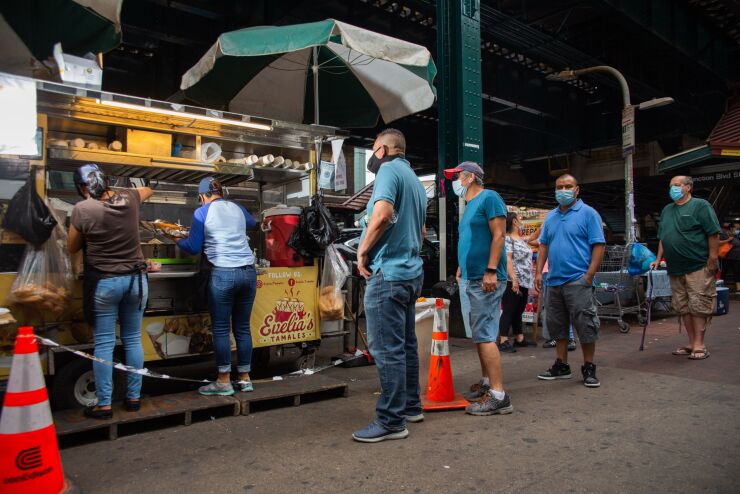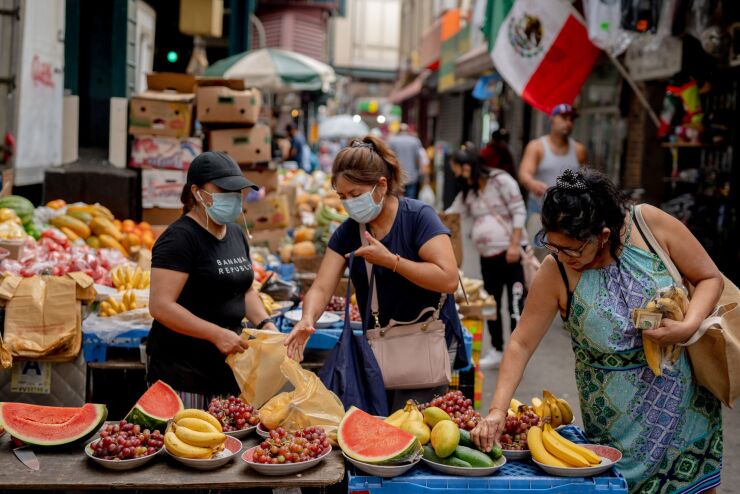Few places illustrate the disparities in coronavirus relief assistance better than New York City.
Wall Street firms, top art galleries, and the private-member club Soho House got millions of dollars in federal aid earmarked for small businesses. Evelia Coyotzi, who operates a food cart beneath the tracks of the No. 7 subway line that connects Manhattan to the outskirts of Queens, got nothing.
Coyotzi — who sells tamales, the popular Mexican dish wrapped in corn husks — didn't apply for the federal Paycheck Protection Program because she had been rejected by her bank for a loan in the past. Her three employees weren't on payroll anyway, she said.
"I didn't think I had a chance," Coyotzi, who is from Mexico, said through an interpreter from the Business Outreach Center Network Inc., a group that's helping her apply for a state loan instead. "I thought my business was too small."

Before the pandemic struck, Coyotzi was renovating a restaurant she had planned to open this year, and that added to her expenses. Coyotzi, one of the about 83,000 foreign-born entrepreneurs who own half of all small businesses in New York City, has so far managed to get through the downturn by using savings and stalling payments for the kitchen she uses to cook her tamales.
The coronavirus hit Coyotzi more than financially. One of her former employees died of the disease. She closed her cart for two months, fearing her workers would get ill by being exposed on the streets of the Corona neighborhood, which was one of New York City's virus hot spots.
Data released this week showed that big-name law firms, Carnegie Hall and companies connected to President Trump and other politicians were among the recipients of 4.9 million PPP loans worth $521 billion as of June 30.
But the forgivable loans, distributed by approved lenders and based on a company's payroll, were out of reach for the myriad cash-based enterprises or underfunded businesses that are key to economic growth in the country. This could change the very fabric of New York City, with businesses that were part of people's everyday life disappearing.
Ahmed Mohsen, whose Halal food cart served office workers in Manhattan, didn't hear back from his bank after applying for a PPP loan in the latter part of April. With no revenue, Mohsen got behind on his credit card payments.

He looked into applying for aid fom the New York Forward Loan Fund, a state program designed for businesses that hadn't succeeded in getting federal relief. But he wasn't eligible because he has been in business for less than a year.
As the city reopens, Mohsen, who lives in Brooklyn, said he's in no position to return to Manhattan because of a lack of funds. He's considering giving up.
"I don't have enough money to buy supplies to start my cart again," said Mohsen, who emigrated from Egypt about a decade ago. "I'm thinking about being a driver now."
Many underfunded business owners confront a barrage of challenges, including limited English proficiency and not having formalized operations including business bank accounts. Those who do have accounts don't always have a sufficient credit history to apply for financing, according to Nancy Carin, executive director at the Business Outreach Center Network. The New York group owns a community development financial institution, BOC Capital Corp., that serves low-income communities with scant access to banks.
Almost a third of small businesses have unmet financing needs in part because they are discouraged or debt-averse, according to the U.S. Federal Reserve. Many don't have accountants that could helped with the PPP application process. Others just simply don't trust the banking system.

"And then there's the problem of operating a business in a zip code where there aren't even any bank branches to begin with," Carin said. "Many owners, already in shock when the lockdowns hit, just weren't in the know and so couldn't benefit from the funding programs."
Underfunded firms are often too small for large banks to serve. The average PPP loan, at $107,000, is more than microbusinesses could borrow. That's where groups like BOC Capital have stepped in. There are more than 1,100 of community development financial institutions managing a combined $222 billion, according to Opportunity Finance Network.
Many immigrant-owned businesses avoid taking on debt, and had bootstrapped their way to running their firms by using personal or family savings, said Shrima Pandey, small-business program manager at Chhaya Community Development Corp., a New York group in that helps low-income communities.
Only about a quarter of microbusinesses — those with $100,000 in annual revenue or less — use bank financing, compared with 57% of small firms with sales greater than $1 million, according to the Federal Reserve's 2020 small-business credit survey.
On top of the initial confusion over how the federal program worked, many underfunded owners didn't have easy access to a computer to apply.
"The technology gap made it harder for them to navigate the process alone," said Chhaya's Pandey.
After an initial $349 billion in PPP funding for forgivable loans was depleted in just 13 days in April, the second round of financing has stalled and the deadline to apply was extended to Aug. 8, with more than $130 billion still available.
But not all business owners are glued to their screens getting minute-by-minute news updates from the world of finance. That was the case for Thidar Kyaw, who runs a store at the back of a small mall in Queens.
It was only in late April, weeks after the federal relief programs were rolled out, that she found out about the package and tried to apply. Kyaw didn't hear back from her bank, and now she's reluctant to apply for a loan in case she isn't able to pay it back.
"The government money had run out so I didn't know what to do," said Kyaw, whose store, Little Myanmar Mini Mart, sells groceries from her home country. To get by, she started selling some products online.





